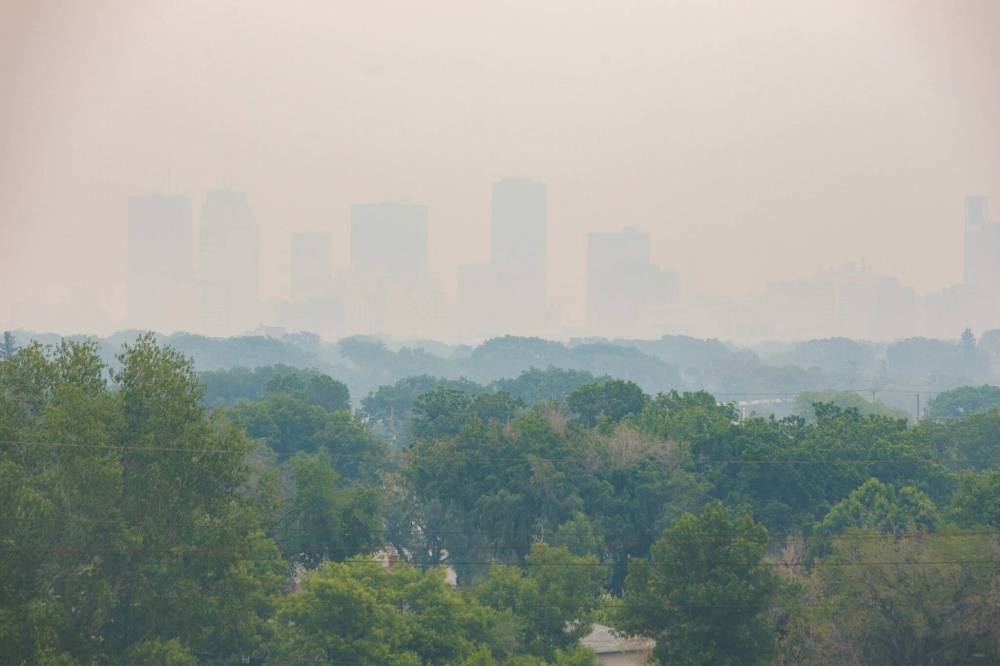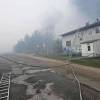Heavy wildfire smoke delays mail, creates health hazard for vulnerable, people working outside
Advertisement
Read this article for free:
or
Already have an account? Log in here »
To continue reading, please subscribe:
Monthly Digital Subscription
$1 per week for 24 weeks*
- Enjoy unlimited reading on winnipegfreepress.com
- Read the E-Edition, our digital replica newspaper
- Access News Break, our award-winning app
- Play interactive puzzles
*Billed as $4.00 plus GST every four weeks. After 24 weeks, price increases to the regular rate of $19.00 plus GST every four weeks. Offer available to new and qualified returning subscribers only. Cancel any time.
Monthly Digital Subscription
$4.75/week*
- Enjoy unlimited reading on winnipegfreepress.com
- Read the E-Edition, our digital replica newspaper
- Access News Break, our award-winning app
- Play interactive puzzles
*Billed as $19 plus GST every four weeks. Cancel any time.
To continue reading, please subscribe:
Add Winnipeg Free Press access to your Brandon Sun subscription for only
$1 for the first 4 weeks*
*$1 will be added to your next bill. After your 4 weeks access is complete your rate will increase by $0.00 a X percent off the regular rate.
Read unlimited articles for free today:
or
Already have an account? Log in here »
Most mail delivery was suspended in Winnipeg Monday and city employees working outdoors were given extra breaks, as the worst air quality in 30 years wafted through the city amid a massive wildfire battle across the province.
Reggie Taman, health and safety officer for the Canadian Union of Postal Workers Local 856 in Winnipeg, said management sent out a notice to the union Monday morning when Environment Canada issued an air-quality warning.
“They suspended door-to-door delivery,” Taman said. “Rolling out of bed this morning, that smoke was harsh. I’ve been a letter carrier for many years and I know the struggle on the street when your breathing is compromised by smoke.

MIKE DEAL / FREE PRESS
A smoke-filled Winnipeg skyline as seen from Garbage Hill (Westview Park) early Monday morning.
“The workers have been advised to deliver the indoor portion of mail — the apartment buildings and businesses — and any parcels, too. Our carriers want to get their work done, but we have to keep our health and safety, too.
“Safety is the objective.”
Canada Post spokesman Phil Legault said all the mail couldn’t get delivered in Winnipeg’s conditions Monday.
“Because of the air-quality issues from the smoke generated by the forest fires, and for the health and safety of our employees, we temporarily suspended some outdoor postal services in Winnipeg,” Legault said.
“Rolling out of bed this morning, that smoke was harsh. I’ve been a letter carrier for many years and I know the struggle on the street when your breathing is compromised by smoke.”– Reggie Taman, health and safety officer for the Canadian Union of Postal Workers Local 856 in Winnipeg
“We are making attempts to pick up mail at customers’ places of business as well as clear mail from street letter boxes… some letter carriers may have made some effort to deliver outdoor at their own discretion. Our delivery agents are asked to never put their safety in danger in order to deliver mail.”
The blanket of smoke in Winnipeg, which caused poor air quality and reduced visibility, came from the northern regions of the province and Saskatchewan.
Environment and Climate Change Canada and the Manitoba Lung Association are warning people to limit their time outdoors because heavy smoke could pose health risks.
Winnipeg has already recorded 29 hours of wildfire smoke through the first two months of fire season, which spans from April to October.
ECCC scientist Christy Climenhaga said that means it has been the city’s smokiest start during a fire season since 1995. The city’s worst year for smoke was 304 hours in 1961, while the second worst was 262 hours in 2021.
“We’ve had a lot early on,” said Climenhaga. “We’ll have to see when the fire season is over in the fall how this year stacks up, but it’s certainly been a busier start.”
Winnipeg’s air quality was off the charts on Monday morning, listed as higher than 10, meaning “very high risk.” Through the day, after a few hours of rain had fallen, it had dropped to four by 6 p.m., considered to be at the low end of “moderate risk.”
Climenhaga said air quality is considered a risk when smoke reduces visibility to less than 10 kilometres. When it reaches that point she said people — particularly those with elevated health risks — should spend less time outdoors.
“Wildfires don’t care if you’re healthy or ill or how old you are, it can impact anyone and everyone at any time.”– Juliette Mucha, Manitoba Lung Association president
Infants, children, adults over the age of 65, pregnant women, and those with health conditions, such as asthma are considered vulnerable.
But Juliette Mucha, the lung association president, said everyone should pay attention when there is this much smoke.
“Wildfires don’t care if you’re healthy or ill or how old you are, it can impact anyone and everyone at any time,” she said.
Mucha said people with health conditions should have necessary items — including medications and an asthma pump, if needed — ready to go in case of an emergency.
The City of Winnipeg employs about 4,200 people who work primarily outdoors.
“Employees who work outside are encouraged to adjust the intensity, length and duration of strenuous activities outdoors, take breaks if needed, drink water and inform their supervisor if they are at high risk of impact from exposure to smoke,” city spokeswoman Pam McKenzie said.
Gord Delbridge, president of CUPE Local 500, which represents city workers, said the union was monitoring the situation.
“This much smoke can have a health impact and everyone is affected differently,” he said. “It’s always a concern for us.”
End Homelessness Winnipeg is distributing masks to people who might not otherwise be able to protect themselves.
“It will be the clinics and hospital emergency rooms which are really going to see an uptick in the number of people requiring support.”– Marion Willis, executive director of St. Boniface Street Links
Marion Willis, executive director of St. Boniface Street Links, said there will be an impact on the city’s health-care system from homeless people who experience breathing problems because of the smoke.
“It will be the clinics and hospital emergency rooms which are really going to see an uptick in the number of people requiring support,” she said.
At the zoo, there are protocols in place to protect the animals and the people who work with them, said Laura Cabak, a spokesperson for the Assiniboine Park Conservancy.
She said staff are supplied with masks and are advised to take more frequent breaks and work indoors, if possible.
“The animal care team monitors the animals for any signs of physical distress, such as open-mouthed breathing,” Cabak said.
“If necessary and possible, an animal may be moved indoors. Our animals always have access to clean, fresh drinking water, which is important all the time, but especially at times like this or during extreme heat.”
kevin.rollason@freepress.mb.ca

Kevin Rollason is a general assignment reporter at the Free Press. He graduated from Western University with a Masters of Journalism in 1985 and worked at the Winnipeg Sun until 1988, when he joined the Free Press. He has served as the Free Press’s city hall and law courts reporter and has won several awards, including a National Newspaper Award. Read more about Kevin.
Every piece of reporting Kevin produces is reviewed by an editing team before it is posted online or published in print — part of the Free Press‘s tradition, since 1872, of producing reliable independent journalism. Read more about Free Press’s history and mandate, and learn how our newsroom operates.
Our newsroom depends on a growing audience of readers to power our journalism. If you are not a paid reader, please consider becoming a subscriber.
Our newsroom depends on its audience of readers to power our journalism. Thank you for your support.









